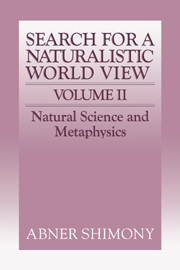Book contents
- Frontmatter
- Contents
- A MEASUREMENT IN QUANTUM MECHANICS
- B QUANTUM ENTANGLEMENT AND NONLOCALITY
- 7 Experimental test of local hidden-variable theories
- 8 An exposition of Bell's theorem
- 9 Contextual hidden variables theories and Bell's Inequalities
- 10 Controllable and uncontrollable non-locality
- 11 Events and processes in the quantum world
- 12 An exchange on local beables
- 13 Physical and philosophical issues in the Bohr–Einstein debate
- C COMPLEX SYSTEMS
- D TIME
- E THE MENTAL AND THE PHYSICAL
- Index
13 - Physical and philosophical issues in the Bohr–Einstein debate
Published online by Cambridge University Press: 05 June 2012
- Frontmatter
- Contents
- A MEASUREMENT IN QUANTUM MECHANICS
- B QUANTUM ENTANGLEMENT AND NONLOCALITY
- 7 Experimental test of local hidden-variable theories
- 8 An exposition of Bell's theorem
- 9 Contextual hidden variables theories and Bell's Inequalities
- 10 Controllable and uncontrollable non-locality
- 11 Events and processes in the quantum world
- 12 An exchange on local beables
- 13 Physical and philosophical issues in the Bohr–Einstein debate
- C COMPLEX SYSTEMS
- D TIME
- E THE MENTAL AND THE PHYSICAL
- Index
Summary
ASPECTS OF THE DEBATE
The debate between Niels Bohr and Albert Einstein concerning the interpretation of quantum mechanics extended from the fifth Solvay Conference in 1927 until the end of Einstein's life. The most dramatic exchange occurred in 1935, when Einstein, in collaboration with B. Podolsky and N. Rosen, published a paper in Physical Review entitled “Can quantum-mechanical description of physical reality be considered complete?”, concluding with a negative answer, and Bohr replied in the same journal, with a paper of the same title but giving a positive answer. Their arguments were restated, in some respects with greater clarity, in the Library of Living Philosophers volume on Einstein in 1949. The disagreements between Bohr and Einstein concerned not only the physical question expressed in the common title of their papers, but also philosophical questions about physical reality and human knowledge.
Much light was thrown upon the Bohr–Einstein debate by the theorem of J. S. Bell (1964) and the experiments which it inspired. Bell showed that any physical theory which applies to a pair of spatially separated systems (as considered in the thought experiment of Einstein, Podolsky, and Rosen) and satisfies a certain locality condition will, in certain circumstances, disagree statistically with quantum mechanics. Consequently, the supplementation of the quantum mechanical description envisaged by Einstein and his collaborators (usually referred to as a “hidden variables theory”) must either violate the locality condition or clash with quantum mechanical predictions.
- Type
- Chapter
- Information
- The Search for a Naturalistic World View , pp. 171 - 188Publisher: Cambridge University PressPrint publication year: 1993
- 1
- Cited by



